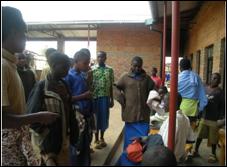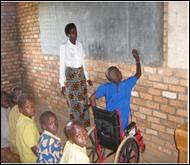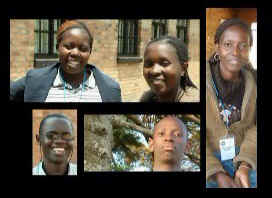

Adrienne NAHAYO, clinical psychologist, shares with us the ongoing work in Rwanda. TFT is helping in the communities, the schools, and even the prisons. Take a few minutes and watch what these amazing and resilient people are doing to heal their country and people. Please consider helping us help them continue this work. It serves as an example the entire world can use.

In June 2012, an international team of TFT practitioners/trainers went to Uganda to make a difference by training locals and treating people along the way. They visited 3 parishes and help relieve stress, trauma and pain for hundreds of people.
The TFT Foundation, a 501(c)(3) nonprofit organization’s mission is to spread the use of TFT and its profound healing throughout the world.
The TFT Foundation has developed and proven a model to bring TFT to any traumatized community, where leaders can be trained to help their fellow countrymen. In three random controlled studies in Rwanda and Uganda, results showed significant improvement and follow-ups have demonstrated the results last and even improve over time.
There are now over 100 Rwandan community leaders using TFT to help their countrymen, like Jean Pierre and Kamal.


I am happy to announce the first of our team of Rwandans from the IZERE Center in Rwanda are arriving in Honolulu tonight. The others will arrive later this week.
 We are so very excited about this project as not only will four Rwandan TFT practitioners become trainers, spreading TFT far and wide in Africa, but many underprivileged in Hawaii as well as the clinics that serve them will benefit from TFT training and treatment during the month of September.
We are so very excited about this project as not only will four Rwandan TFT practitioners become trainers, spreading TFT far and wide in Africa, but many underprivileged in Hawaii as well as the clinics that serve them will benefit from TFT training and treatment during the month of September.
Using TFT to relieve the effects of trauma can open people to peace, compassion and community. It is the intention of the TFT Foundation–to make trauma relief available on a global scale! You can learn more about he Foundation’s work by clicking here,
We would like to ask for your help to cover some of the expenses in this far reaching project. As the air tickets were more costly than expected, and we have over run our budget.

We are seeking donations toward their food and incidentals while in Hawaii. If anyone can assist us with this, we can accept donations of any size. If you would even assist with one meal, it would make a huge difference for our guests from Rwanda.
Thank you all for your help with this sharing of TFT with those who need it.



We have received a request from Father John Mary Vianney, a priest of Byumba Catholic Diocese in the northern district of Rwanda. He heard from a seminarian, KATANGA Raphael (salesian of Don Bosco) about our work with traumatized people.
Father Vianney has asked for us to come to his diocese as there are many cases of children and youth who suffer from HIV/AIDS, loss of family, disabilities, genocide survivors and other. They have requested a team come in July 2009 to train and treat. Dr. Caroline Sakai is willing to go in late July and stay two weeks. They want to have us train about 30 people who can then assist others in their community. The people of Byumba at NYINAWIMANA have built a center that they call the IZERE Center. The word seems to mean peace and reconciliation.
 Those who have been trained will treat others at the IZERE Centers in the other communities. They want us to also treat some cases of trauma at the IZERE Center. They have about 300 people that they would like treated but we may have to limit the amount of people treated during depending on how many ATFTF Trauma Relief therapists are deployed.
Those who have been trained will treat others at the IZERE Centers in the other communities. They want us to also treat some cases of trauma at the IZERE Center. They have about 300 people that they would like treated but we may have to limit the amount of people treated during depending on how many ATFTF Trauma Relief therapists are deployed.
They propose to make a small ATFT group formed of the 30 newly trained therapists who will treat others at the IZERE Center. They want us to supervise the newly trained therapists as much as possible before our departure.
Goal: To improve on the lives of the people affected by genocide, war, poverty and physical handicaps.
1. Begin a program focused on treatment of the effects of trauma caused by genocide and psychological effects of poverty and being physically handicapped.
2. To identify people affected by genocide (trauma cases), poverty (orphans, widows, handicapped people, and traumatized people) and to group them according to their needs.
3. Sensitivity training and education aimed at creating peace, forgiveness, unity, reconciliation and confidence among neighbors, and to cultivate a spirit of collaboration and mutual help.
-To provide physical and emotional treatment to all people
-To continue training; Members of the IZERE Centre will train and supervise others
-Counseling
– Reduction in the cases of trauma
– Increased knowledge about trauma and how to
diagnosis it.
– Ease education of traumatized children
– Good relationships among people (peace, forgiveness, reconciliation).
Suzanne Connolly TFT-Adv
*Note: ATFT Foundation is an IRC Section 501(c)(3) public charity to which contributions are deductible for federal (USA) income tax purposes in accordance with the provisions of IRC Section 170.

CASE NOTES from the 2009 Rwanda Trauma Relief Mission
By Suzanne Connolly, LCSW, LMFT, TFT-Adv
During these two days we treated over 60 people from the district of Byumba, the young and old, all of them poor people of the countryside who live by sustenance farming. These were persons who wanted to participate in the study but due to the fact we had prepared materials for 200 only, they had to be excluded. Father Jean Marie Vianney reported that there was some upset because they couldn’t participate and so we decided to treat them ourselves over a period of two days.
 Suzanne Connolly says, “My first client on the 16th lost her only parent and her beloved fiance in the genocide of 1994. She was given shelter in a refugee camp in the Congo, and while there married and had children. When she was able to return to Rwanda she and her husband had to be tested for the HIV virus. Unfortunately her
Suzanne Connolly says, “My first client on the 16th lost her only parent and her beloved fiance in the genocide of 1994. She was given shelter in a refugee camp in the Congo, and while there married and had children. When she was able to return to Rwanda she and her husband had to be tested for the HIV virus. Unfortunately her
husband tested positive. She lost several children, likely to AIDS, and she now practices safe sex. Her husband is very sick and cannot work. Her life is very sad because of these losses and because she alone must work very hard to support the family. She wants to have more peace about her losses and difficult circumstances. In a very short time, by using TFT, this woman was able to feel peace around her present circumstances. Her SUD level went from a ten to a one and the change in her facial expression was remarkable.
Another young woman, only twenty-two years old with a young baby has a husband who drinks too much, and insults her. He sometimes tells her to sleep outside with the chickens. She reported that she gets so angry she cries. She loses her voice and cannot even speak. We talked about not arguing with him or defending herself verbally when he’s drinking as it does no good, but at the same time, not agreeing with him. She could say things like, “That’s your opinion, I don’t think this, but we can agree to disagree”, and she can still keep her dignity. But more importantly, she cannot be assertive in this way if she is so anxious and upset that she cannot even find her voice and literally cannot speak.
Using TFT we worked on her sadness and her fear and anger around her husbands “bad behavior” and she could no longer work up the upset she previously experienced. She could now picture herself being positive in the face of her husband’s bad behavior. Her throat was not constricted and she felt like she had a voice even under these circumstances.
The last person I treated on August 16th lost her husband and all seven of her children in the genocide of 1994. She understandably reported much sadness. She couldn’t even imagine feeling peace after this tragedy in her life. She reported that she has flashbacks during the day and flashbacks that wake her up at night. She has had very bad dreams consistently and was afraid at night. She suffered from painful feelings of loneliness. We used TFT to address her symptoms of trauma. Her face, which was very sad when she arrived, began to brighten and eventually her frown grew into a huge smile. Her worn but beautiful face glowed and she was full of hugs and gratitude. She now could not bring up any sadness. Her only concern was that these good feelings might not last. I assured her, as I had assured the others, that likely the good feelings would last, the bad feelings they worked on almost never return.
I told her that the Rwandan therapists will now be working at the Center and would be able to help her should any of these fears and other negative feelings return.
One man reported only physical symptoms. He suffered from headaches, back-aches stomach-aches and chest pains. He often couldn’t work and felt very sad and reported feeling like ‘half a man’.
He had been to several clinics and nothing seemed physically wrong with him. He said that he is not bothered by the trauma of the past. He ran from the perpetrators who were chasing him with guns and escaped by hiding.
However, most of his family was killed. At the same time, he reported no anger, fear, feelings of guilt or sadness. However as we conversed he mentioned flashbacks and bad dreams. His flashbacks were so severe that when he experienced them his neighbors accused him of being crazy. When he thought about the events that came back to him as flashbacks and bad dreams he reported a SUD of 8. We worked with the memories that come up during his bad dreams and flashbacks and he soon felt only feelings of peace. He was not experiencing pain at the time of his treatment because he was taking pain medication for his symptoms. We are hoping that by addressing his symptoms of trauma his physical symptoms of pain will also be reduced as these symptoms appeared for the first time soon after the genocide.
One woman whose husband was killed during the genocide spoke of the double pain she experienced because he was a person of a certain ethnic group and was mistaken for a person of another ethnic group and killed. Because of their relationship to him, she and her children were pursued but she was able to hide herself and her children. One of the children was killed a week later by a bomb and another has been missing and presumed dead since 1994. She has one child in secondary school that did very well but she could not afford school fees so the girl now lives at home and cannot go on with her studies. She is not entitled to genocide survivor benefits because of her ethnic identity. Her daughter’s having to drop out of school was the woman’s greatest concern and greatest cause of anxiety. TFT successfully addressed her feelings of despair and after about an hour and forty five minutes of treatment to address her past trauma and her current anxieties she reported a feeling of peace in her heart when remembering her losses and in thinking about her current unfortunate circumstances.
Another woman was eleven years old in April of 1994. Whenever she sees soldiers she has intense fear although Rwanda is not at war and the soldiers now work as peace keepers. It is unclear what she witnessed or experienced concerning soldiers in 1994, however her fear of soldiers seemed crippling, as soldiers are everywhere in Rwanda. At one point, while she was concentrating on her fear she opened her eyes and looked at our interpreter and said, ‘You are a soldier’. This young woman’s fears were successfully alleviated to the point where she could think about seeing them along the road and be able to pass by them and even greet them.
During these two days I treated fourteen persons all with similar problems to the ones above. Others included alcoholism, loneliness and three women who had intense fears of the loved ones they lost coming back as ghosts during the night.
Between us we successfully treated 58 of the sixty persons who had not been admitted into the study due to the 200 study slots allotted already having been filled.
